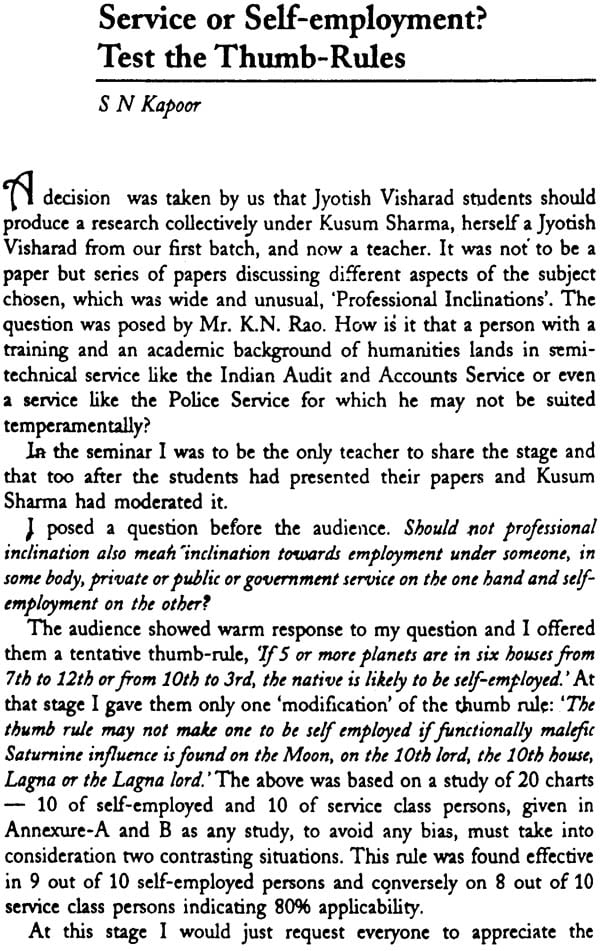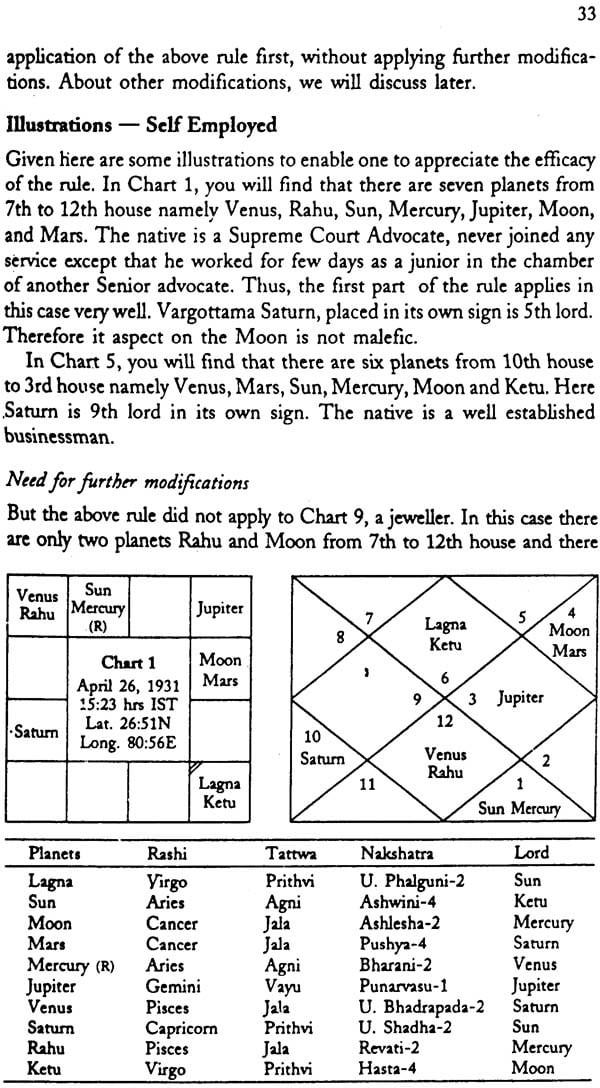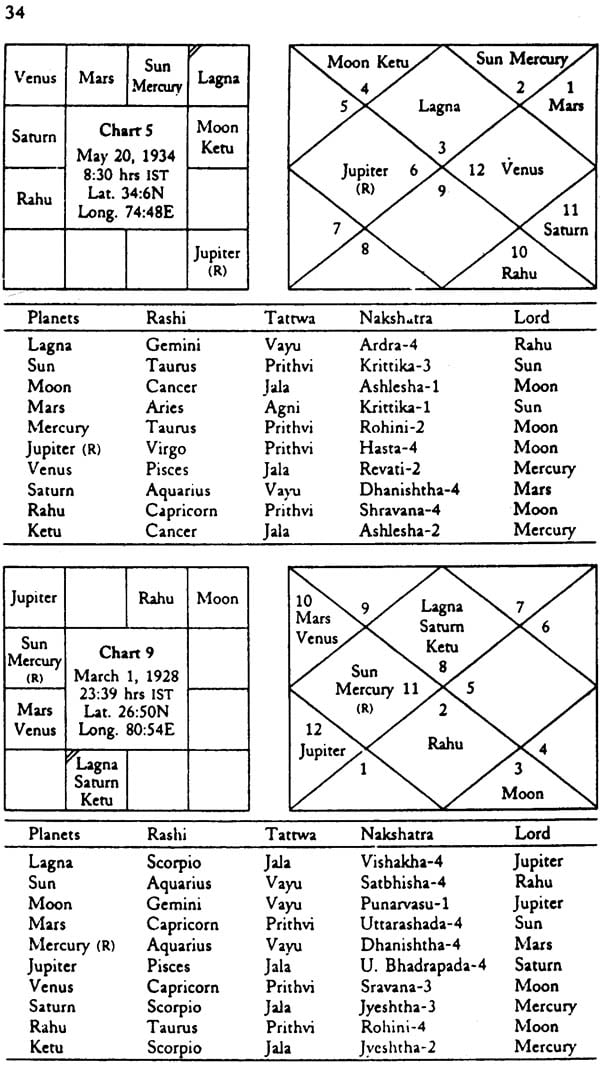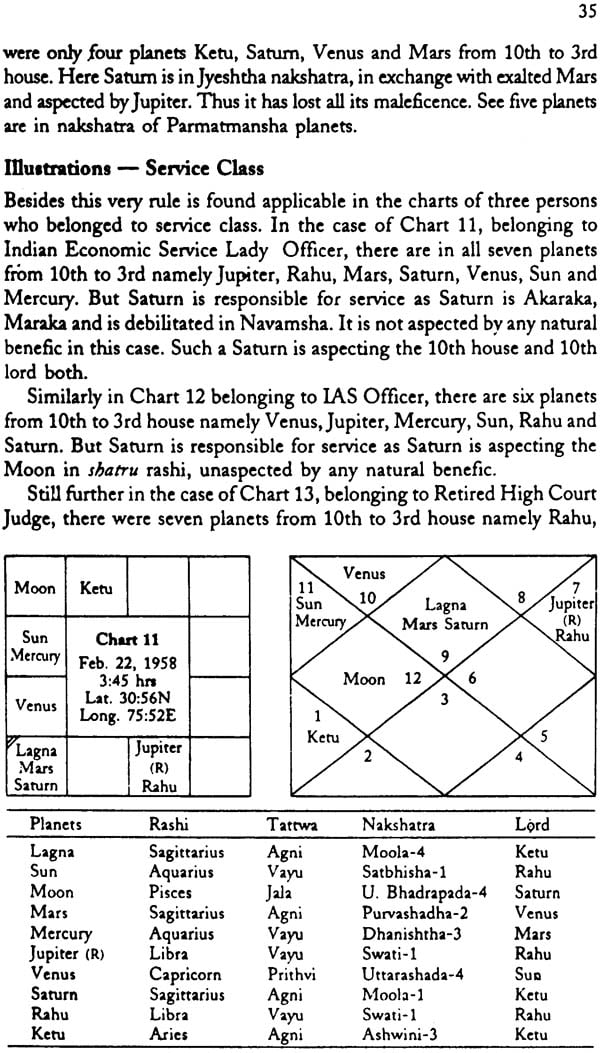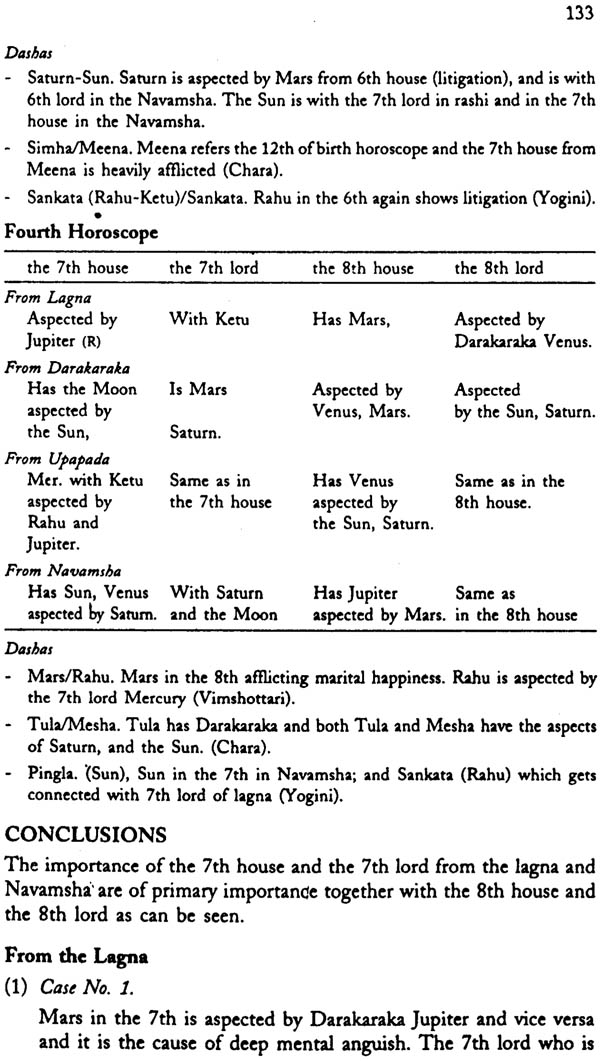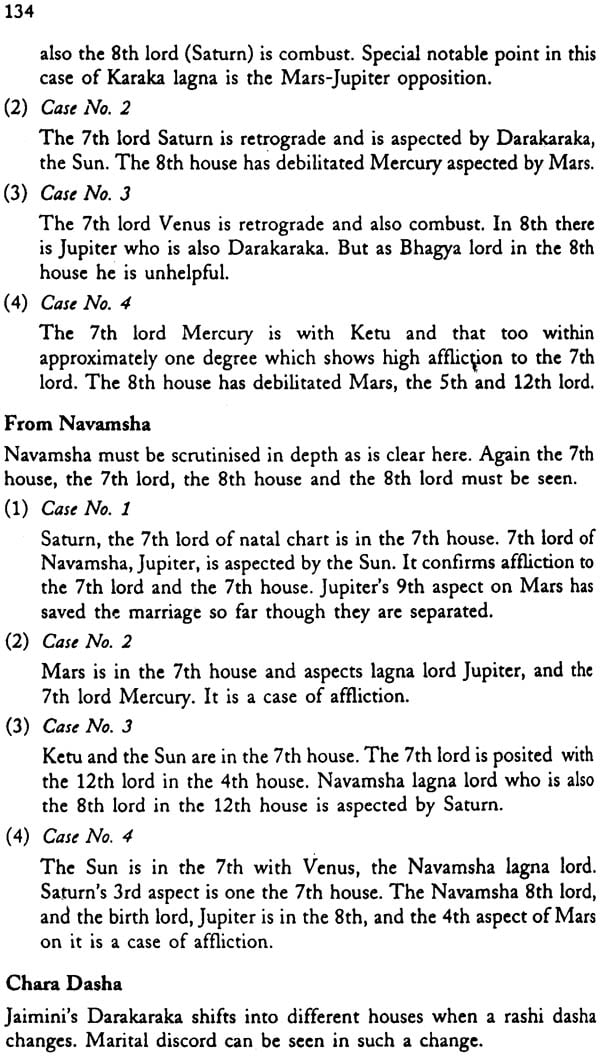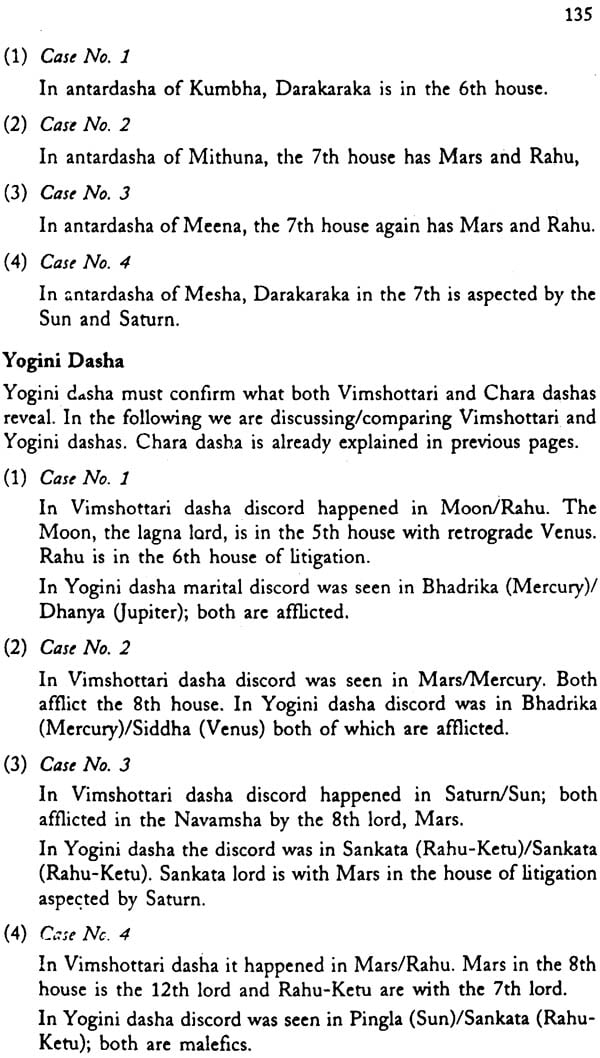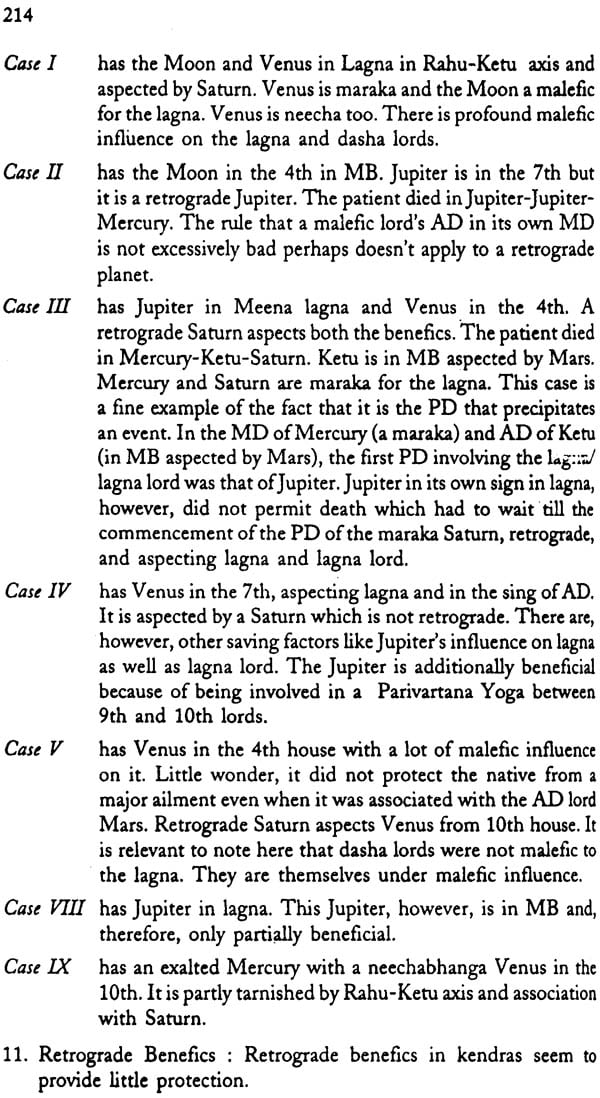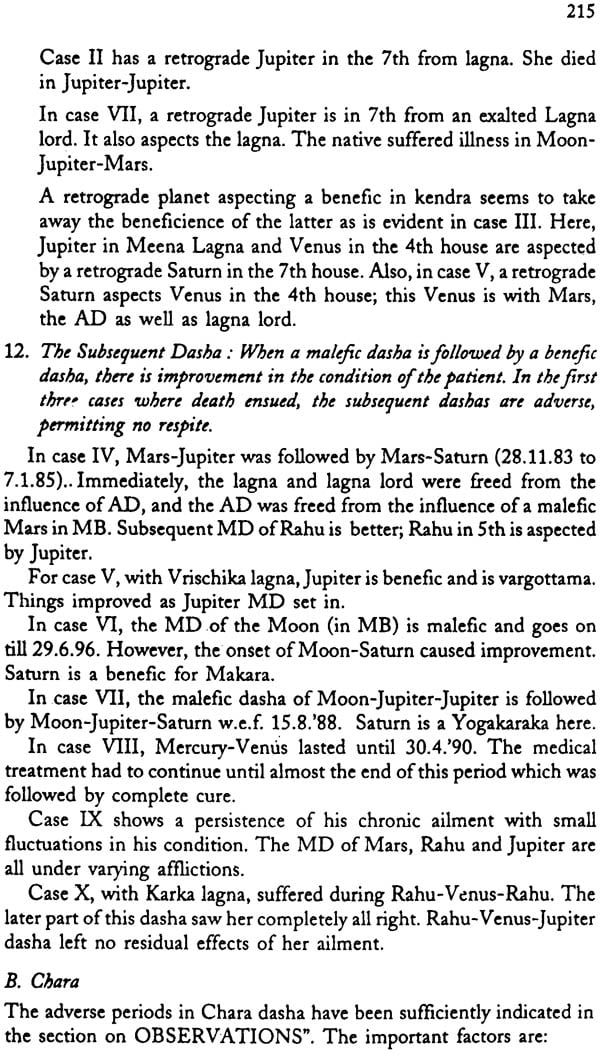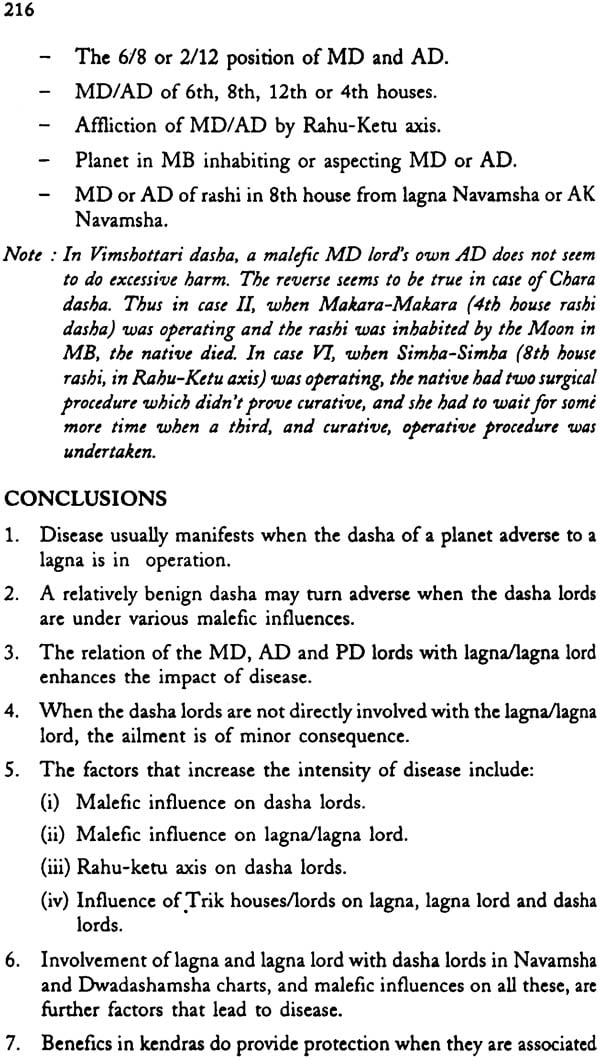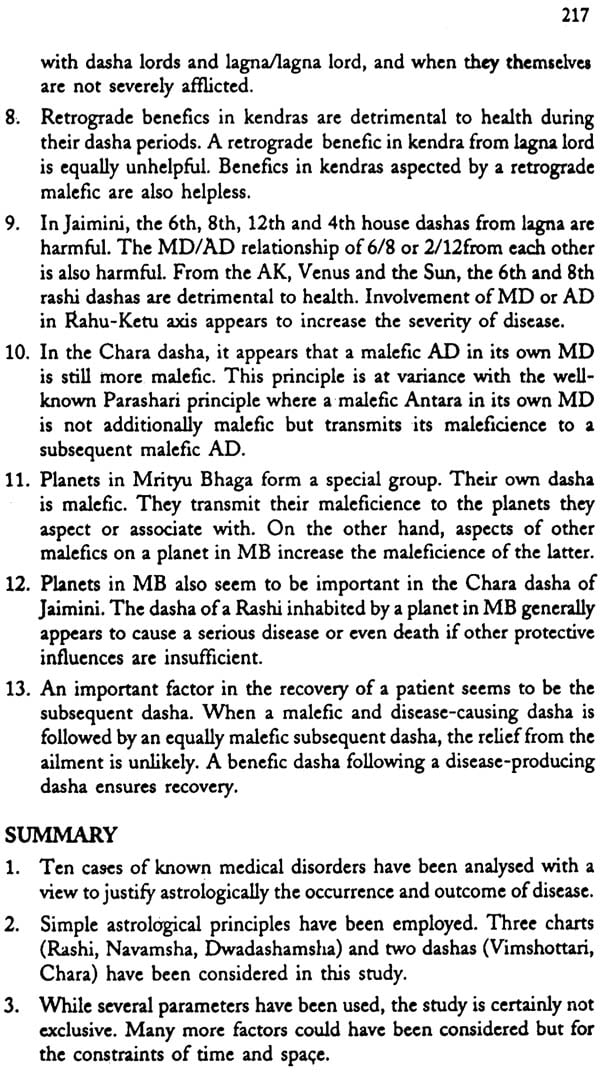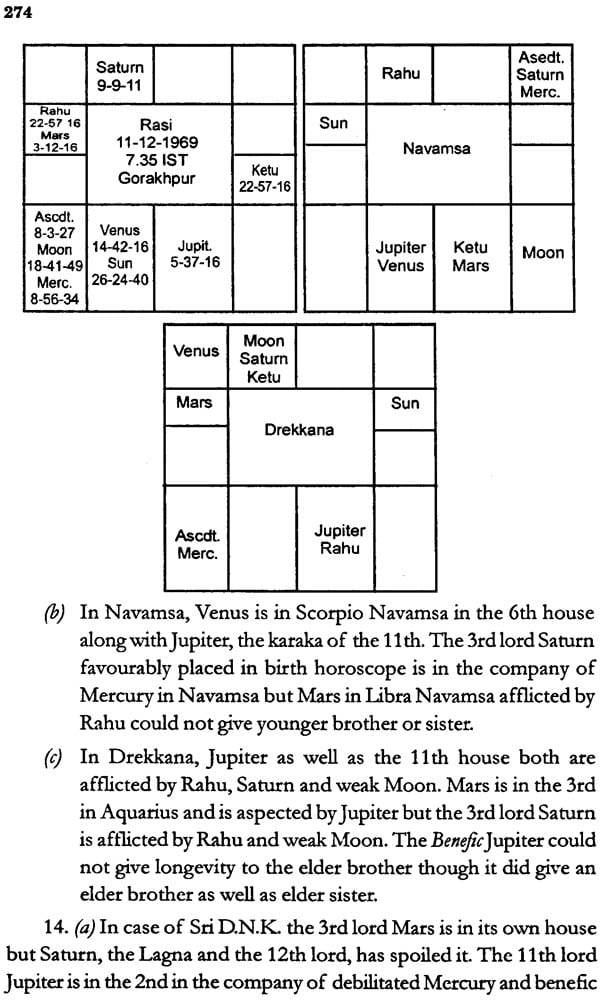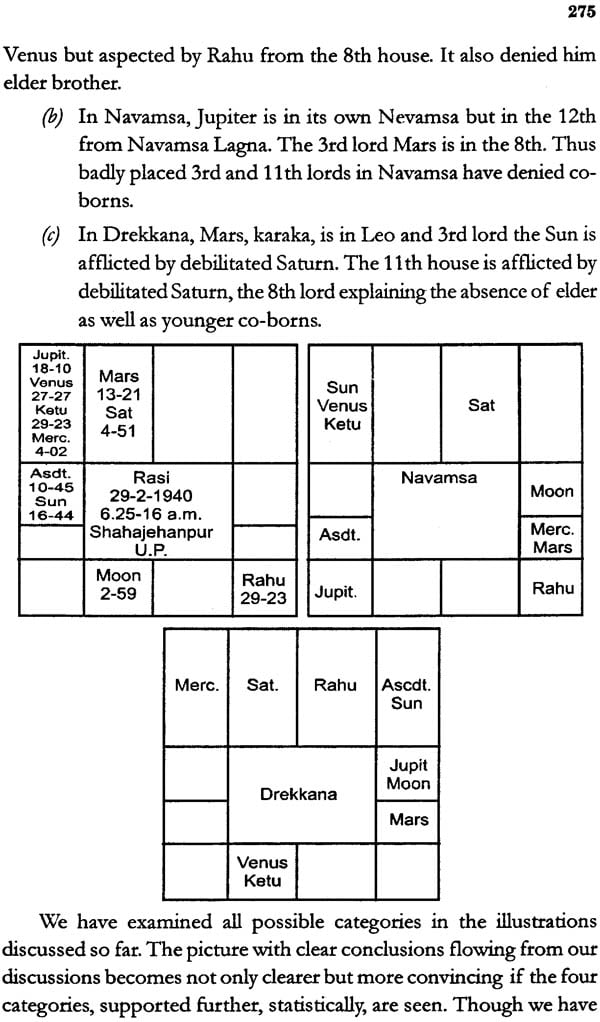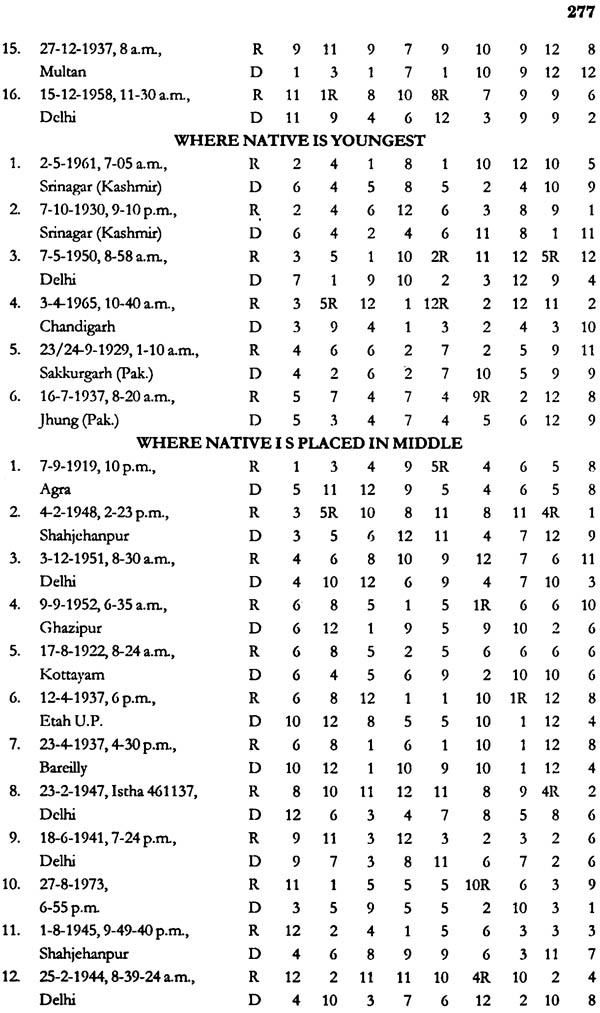
Advanced Techniques of Astrological Predictions
Book Specification
| Item Code: | NAM094 |
| Publisher: | Bharatiya Prachya Evam Sanatan Vigyan Sansthan |
| Language: | English |
| Edition: | 2016 |
| ISBN: | 8186089047 |
| Pages: | 288 |
| Cover: | Paperback |
| Other Details | 8.5 inch x 5.5 inch |
| Weight | 340 gm |
Book Description
“This volume is totally different and blazes a new trail in contemporary astrological literature because it brings out methods not commonly explored but dormant in classical literature on astrology.
...There is, in some papers, a fusion of Parashari and Jaimini principles. All papers however are primarily based on classical techniques of vedic astrology...Mr. Rao has all along ensured that the predictive techniques evolved through the research under his guidance are such as to answer the test of replications, which is valid evidence of its scientific nature. Mr. Rao has the advantage of students involved in these studies, being highly qualified in their own fields and therefore not only equipped with the right frame of intellectual inquiry but also conversant with research techniques....The subjects handled in these papers are the elections (political), the little understood but much dreaded Kaal Sarpa Yoga, marriages through the Annual chart, Professional aptitude, 5th house matters and disease, its onset and outcome....Some of the conclusions arrived at in the papers are interesting and should be tried independently by all serious students of astrology...We commend this volume to all lovers of astrology.
The Astrological Magazine (Jan.1992)
The book, a compilation of research papers on replicable predictive techniques has been landmark in the Astrological world. The first edition was sold out in less than a year and a half, testifying to the usefulness and wide acceptance of these replicable to techniques.
Three notable features of these research papers are:
• They are fundamental, being based on the fundamental principles of classical Vedic Astrology.
• They are composite in an innovative way.
• They are multi-data based, leading to an expansion of even a micro research into a macro research at any time.
• Latest addition includes a research article on the impact of Saturn & Mars is third house.
This book gives totally dependable and replicable predictive techniques which can be replicated thousand times with ninety percent or even hundred percent accuracy. A book that must be possessed by any astrology wanting to hone his predictive tools or enhance the accuracy of his predictions.
The glowing review of the first edition of this book in the Astrological Magazine (January 1992) created a demand for another edition published in 1994. 1999, 2005 and now the latest one is published on great demand of Astrologers.
Sansthan has published many standard books on Astrology after this book.
The second volume of this book was published in the year 2014. Sansthan is committed to make available research articles and standard books to the readers.
The need felt by us to bring out this compilation of research papers produced by the members of the teaching staff and the students of the Indian Council of Astrological Sciences, Delhi Chapter One (Bharatiya Vidya Bhawan), New Delhi is being explained.
The production of books on astrology in India in English and various languages, and, in the west, is so frequent that a keen student of astrology who can afford to buy these books gets confused after reading them. Some of these books may initiate a student into what may appear to be an astrological process and the discipline of making predictions without actually teaching the techniques of predictions. There is no single book in the market which gives dependable technique of prediction.
Astrology, a divine science, is a purely predictive science only and its demand and utility is also because it is a predictive science. There are patterns everywhere in nature, in the life of a microbe, in weather, in human life and situations etc. which repeat at a given point of time. Predicting the emergence of such patterns at a particular time is what an astrologer alone can do. To know about such patterns and to know, in advance, the time when they would show up is what an astrological prediction is.
What then are successful astrological techniques which can be replicated? The question asked by physical scientists as to how planets so far off can affect human destiny springs from their dogmatic belief that a science can only be a direct relation between the physically visible cause to the physically visible effect. Some of the open-minded scientists may be convinced with proofs of the physically visible effect, like dates of rainfall, sea–storms, mundane events when shown, not the physically visible cause, but a line of astrological reasoning, scientifically arrived at.
This can be done only when enough statistical researches are done. Those astrologers who talk only of intuition and not the need for statistical researches should know that without statistical researches, intuition can function only in a vacuum.
Statistical researches are of three types, as far as astrology is concerned:
(a) The first type is impressive only with the statistics it collects. Michel Gauquelin’s findings that Mars occupies a prominent position in the horoscopes of men in medical profession or that Jupiter occupies a similar position in the horoscope of men in legal profession is not useful in making a correct prediction about careers and profession. It is not a valid piece of astrological research but does make the physical scientist wonder if frontiers of science extend beyond the borders he has been taught to accept as its last known post.
(b) The second type of statistical research is based on full horoscope, study of planetary patterns, time-cycles, whether of transiting planets or dasha- systems. Such researches provide a useful break-through and help astrologers predict with ease and confidence.
(c) The third type of statistical research is micro-in-depth research on a few selected cases. It resembles a doctor’s diagnosis of a disease. The doctor asks the patient to undergo many medical tests, like X-rays, scanning etc. to arrive at a proper diagnosis through elimination. An astrologer who does not cast various divisional horoscopes and use different dasha systems and Ashtakavarga is like a doctor who does not believe in so many tests.
But to prepare all these and use them is what astrologers do not do because there is no book on the use of these predictive tools. And there are astrologers and astrologers who have written books after books which, totally useless as they are, teach nothing. True, there are writers who have written some useful books on classical techniques of predictions. But their books have two serious deficiencies: the first they have not understood the classical techniques sufficiently well to be able to illustrate them and secondly, worse, still they have not been able to show through various examples how different techniques should be fused into a more precise and effective predictive technique. Hints about such fusion of the Parashari system with Jaimini astrology are available in Jatak Tuttwa.
But we have writers claiming to have written a dozen books not one of which answers the need of the student in search of dependable technique of prediction.
The researches in this collection belong to the second and third types of statistical researches mentioned above, not o the first type which is massive in volume, like a giant of an iceberg, but teaches nothing useful to an astrologer.
Intensive in-depth micro-researches when expanded become macro-researches. They cannot be understood by physical scientists. They cannot even be appreciated by astrologers who do not know different systems of vedic astrology and the use of divisional horoscopes.
Many of the researches in this collection are super-technical researches which can be understood only by astrologers who have good and wide training in the classical technique of Vedic astrology. These are researches by astrologer-students for astrologers.
The Delhi Chapter One initiated such researches as early as 1989, in the third year of its decision to start astrology classes in the Bharatiya Vidya Bhawan, New Delhi. The first such research was a complex one by Y.K. Bansal, the topper of the Visharad examination of 1989. It is on general elections in India and Jaimini astrology. The research was so sound that he made a prediction (not publicised as he fell sick soon after) that elections would be announced on or around October 18th, 1989 the basis being the transit of Rahu and its effect as seen through Jaimini aspect. Elections were announced round about this date. On this very basis another prediction was made, this time in writing in Vishwa vijay Panchanga (Hindi) that mid-term poll would be held after the entry of Saturn in Capricorn in 1991 and before the entry of Rahu in Sagittarius (April 1991). The President of India announced the dissolution of the Lok Sabha in March 1991 and the stage was set for mid-term poll as clearly foreseen astrologically.
The second astrological research was on Kaala Sarpa Yoga by Z. Ansari in two parts, with other parts remaining to be done. The first part is being published in this collection.
Dr. R.K. Vishwakarma, like Z. Ansari produced his research in 1990 on predicting Marriages through annual horoscopes or Varshaphala.
The researches by students got an impetus only in the early part of 1991 when students of Visharad of previous two batches produced their paper on ‘Professional Inclination’ on nearly a hundred horoscopes to understand and explain why a person with an academic background entirely unsuited for his present profession, had to ‘incline’ towards it under the weight of planets in his horoscope and the crucial dasha running at a given time. But this major research will take more in-depth analysis before it becomes ripe for publications.
In the meantime Visharad students decided to do in-depth micro-researches by applying well-known predictive techniques, the well-known Parashari and the lesser known Jaimini aspects and dashas. It is only such researches that can become useful and valid predictive techniques, being reliable statistically, answering the welcome accusation that the principles of replication do not apply to astrological predictions.
| Preface | iii | |
| About the Contributors | vi | |
| 1 | Introduction | 1 |
| 2 | Evolution of Cosmology | 9 |
| 3 | Education for a Career and the Tension of Parents | 15 |
| 4 | Service or Self-employment? Test the Thumb Rules | 32 |
| 5 | Profession and Planetary Influences | 50 |
| 6 | Career Prospects and Ashtakavarga Applied to 'Vimshottari Dasha | 68 |
| 7 | Authors and Journalists : An Astrological Enquiry | 80 |
| 8 | Successful Indian Women in Different Fields | 90 |
| 9 | Tajik Shastra and Marriage Timing of Event | 104 |
| 10 | Role of Dashas in Marital Discord | 120 |
| 11 | Marital Disharmony | 140 |
| 12 | jaiinini Astrology and General Elections in India | 160 |
| 13 | Kaal Sarpa Yoga: Part I | 180 |
| 14 | Disease: Its Onset and Outcome | 191 |
| 15 | Prasthar-Ashtakavarga System of Prediction with Accurate Time Period | 219 |
| 16 | Mystic Trio in Astrology | 230 |
| 17 | Role of Darakaraka in Vimshottari Dashas | 236 |
| Third House Position of Saturn and Mars | 244 |
